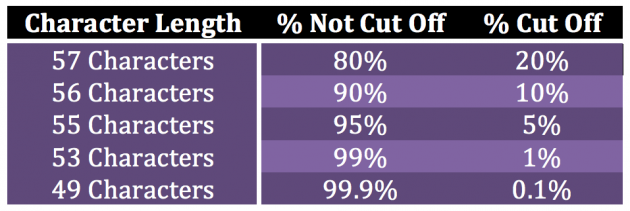Title Tag Length in Pixels, Not Characters
- David
- July 28th, 2014
Earlier this year, SEOs scrambled to shorten all their title tags in order to appease the new SERP changes by the almighty Google. While most internet users probably never noticed the changes, many SEOs scrambled to measure their title tag length in pixels and was reported early on by Screaming Frog. What were the new length requirements? How would this affect click-through rates? Would our SEO plugins be updated?
The Pixel Width Changes
It didn't take long for the experts to figure out the new guidelines. Google had increased the size of the title in the search results from 16px to 18px. The bigger news was that pixel width now seemed more important than the traditional character length. While we used to look for 60-70 characters, now we were looking at 512 pixels to work with, which translated to somewhere around 50-55 characters.
Title Tag Too Long… Or Not?
When a title tag is too long, Google cuts off the title at less than the allotted 512 pixels so it can append an ellipsis to your search result. While many SEOs live in fear of the dreaded ellipsis, others haven't been deterred by it. Moz has put together a great free pixel width testing tool that allows you to test your title tag length in pixels.
From a ranking standpoint, it seems that Google's algorithm doesn't distinguish between keywords that appear in the search results and keywords that don't. If the keyword is in the title tag, then Google seems to take this into account when serving up the search results. Of course, this doesn't mean you should stuff your title full of keywords, but you needn't be afraid of leaving the most important ones in there.
So that means the title tag length really only matters for the user experience and CTR. Some SEOs think that an abridged title tag means no clicks at all, while others are convinced the suspense of the ellipsis will increase the intrigue of your potential audience. As long as the search query is in the visible portion of the title tag, searchers will know the link is relevant. The average internet user isn't going to say, "Well, I'm not going to this site. They can't even keep their title tags short enough for Google."
Title Tag Pixel Recommendations
Here are the basic best practices for title tags:
- Under 512 pixels in width, generally 55 to 60 characters
- Place keywords as close to the beginning as possible; The closer to the beginning makes it more likely that searchers will see them
- If you include a brand in the title tags, place it at the end unless it is a well-known brand people seek out
- Make each title unique
- Avoid stuffing keywords
Ultimately, title tags are still one of the most important on-page elements of SEO. If you put your main keywords at the beginning of the title tag and keep it reasonable in length, you probably don't need to stress yourself out about a few extra pixels.
Feedback
We always welcome feedback on any changes or updates that you may have experienced in your testing.




Very Good Site and awesome writing too , and great thanks to the writer
Supernsetips